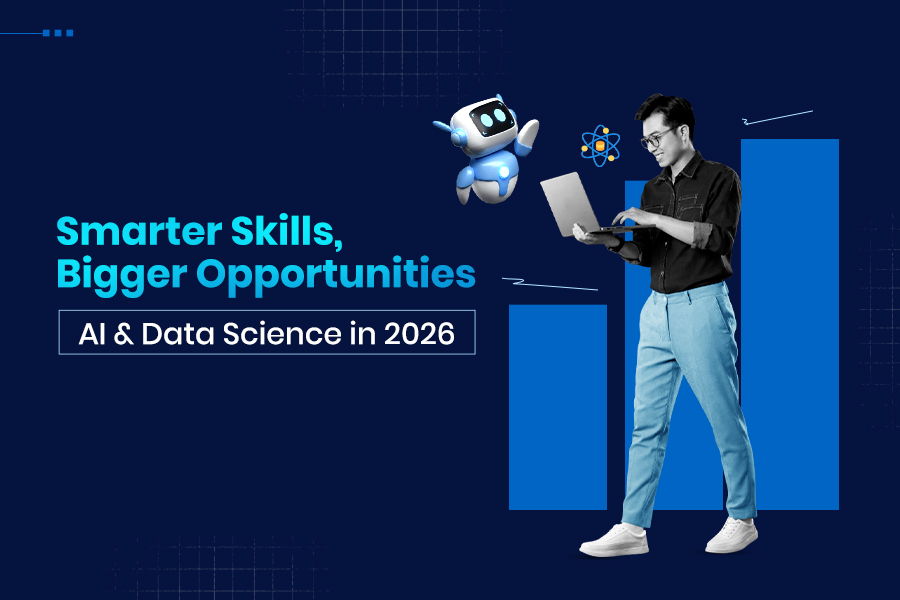
In their Future of Jobs Report 2025, the World Economic Forum ranks AI and big data at the top of the list of sought-after skills.
This means that employers across industries are currently and for the foreseeable future actively seeking candidates with practical skills in Data Science and Artificial Intelligence.
Are you considering a job in data science and AI?
It will be encouraging to learn that Data Science professionals in India can earn more than ₹ 25 LPA, mainly in senior leadership roles.
And, before you decide whether this path is right for you, it helps to understand what AI and Data Science actually mean in simple terms.
What is AI and Data Science?
AI refers to systems that are designed to learn from information, notice patterns, and make decisions without a human guiding it throughout the process. These can be simple tasks or complex ones. That depends on the problem at hand.
Data Science is a related field. It deals with gathering data, cleaning it, studying it, and pulling out insights that can be put into real-world use. Most AI systems would not work if the underlying data were not made usable.
So technically, it is Data Science that gives AI the material it needs to learn. In turn, AI gives Data Science the speed and accuracy needed to handle huge amounts of information. Both fields keep feeding each other. That is why they are usually taught together.
The rapid, consistent growth of these fields has led to high demand for data science and AI experts.
Why is the Demand For AI And Data Science Skills growing?
Data is the new gold.
More than ever before, companies are dependent on data. Naturally, this would increase the need for people trained in AI and Data science.
Every department, whether it is marketing, logistics, finance, or healthcare, depends on reliable insights.
Take any business that’s attempting to grow among competitors. It would need experts who can refine, interpret, and translate data into clear actions. That is why the fields of Data Science and Artificial Intelligence continue to grow even when markets become uncertain.
You can take advantage of this high job demand by enrolling in a Data Science course in Kolkata to kickstart a lucrative career. Since employers are on the lookout for certain technical skills, you should be well-versed in them. This will help you boost your career in AI and data science.
In-Demand Technical Skills Gained from the Data Science and Artificial Intelligence Course

A good data science course with AI would cover the tools and skills you are likely to use daily once you start working.
Students like you will get familiar with the practical skills and technologies that you will use in your data science career.
You will begin with SQL and data visualisation and move on to more advanced topics like deep learning and Generative AI.
These are the main skills students can expect:
1. Proficiency in programming languages Python and R
While training for a career as a data scientist, handling large amounts of data will become your life.
As part of your course, you will gain expertise in certain programming languages such as Python, R and SQL. This will equip you to sort, analyse, and manage ‘big data’ efficiently.
Most AI and Data science work uses Python daily, so the comfort you build here matters a lot.
2. Strong understanding of SQL
In case you didn’t know, most businesses store their information in structured databases.
SQL enables you to access that data quickly.
For this, your course trainers will teach you how to write queries that extract only the information you need.
This one skill will become the backbone of almost every data-driven project that you will work on in your career.
3. Machine Learning Basics
When you are taught ML basics, you will basically come to know how exactly computers can recognise patterns. Machine learning introduces students to different ways models learn and make predictions.
Don’t fret, you do not need to be a math expert to understand it. Course instructors will make things simple with explanations and step-by-step guidance.
Through continuous practice, you can build your confidence in these concepts.
4. Deep Learning Basics
After you are confident in machine learning, the course will move on to deep learning.
Basically, it teaches you how neural networks work and how they handle complicated tasks, such as image recognition or natural language processing. Most beginners find it challenging at first, but once explained well, it’s manageable.
5. Data Visualisation Tools
Once you start presenting your work, visual tools will come into play.
Here, Power BI or Tableau are helpful. These tools are designed to show information with charts and dashboards. In case you’re wondering, yes, it’s simple enough for anyone to understand.
The way it works is, you will be able to explain even the most complex data in neat, simple visuals.
6. Generative AI tools
Trainers will also teach you how modern AI systems create new content.
Generally speaking, generative AI today is used not only in chatbots. It is being used in writing code, summarising data, and improving productivity.
Knowing how to use such tools responsibly gives you an edge when applying for jobs.
7. Cloud and big-data platforms
Data is continuously growing. This is why most organisations turn to platforms such as AWS, Azure, and Google Cloud.
Your course introduces you to these platforms so you can work comfortably with large data sets.
This would also prepare you for real workplace environments where most teams have shifted toward online data storage and processing.
On top of all these technical skills, you would have to stand out from the rest of the candidates interviewing for the same job role as you. You should be aware that hiring managers have certain parameters in mind.
What Recruiters Look For, And How To Stand Out
It always helps to remember that recruiters hire candidates with strong people skills. When they meet a candidate with strong fundamentals and a practical way of thinking, it immediately catches their attention.
Here’s what recruiters want:
-
Practical project work: Demonstrate that you have worked on real datasets. Keep your explanations clear and simple.
-
Logical thinking process: Give a breakdown of how you approached a task. Recruiters notice clarity more than big technical words.
-
Tool confidence: Show that you can use Python or SQL efficiently. They need to know you are familiar with the necessary tools.
-
Communication skills matter: Speak in plain language. Preferably, avoid the use of jargon, as recruiters appreciate simplicity.
Now that you know what recruiters expect while hiring candidates, it’s good to learn about the various career paths you can choose from.
What Career Opportunities Are Available After A Data Science Course?
What happens once you’ve completed your Data Science course?
The good news is that job roles in the Data Science and Artificial Intelligence space have been steadily growing each year. The reason for this is that companies depend more heavily on structured decision-making.
Getting familiar with the various job roles available will help you find out which one suits your interests and strengths.
Data Analyst
Organisations hire data analysts to help them figure out what their raw data is saying. Their work involves turning numbers into clear insights that guide everyday business decisions.
Data Scientist
Data scientists are the ones who create models and run experiments. Their end goal is to help businesses solve complex challenges. Much of their work is the basis upon which major business decisions are taken.
Data Engineer
Professionals in this role are responsible for making the flow of data from systems to analytics tools smooth. Essentially, they create pipelines that maintain the information clean, usable, and ready for analysis.
Machine Learning Engineer
ML engineers work on taking AI models into production. Their work ensures that the systems run smoothly and perform at scale with accurate results.
Business Analyst
A business analyst stands at the mid-point where data and business needs meet. They translate insights into action, improving performance and guiding teams in the right direction.
Business Intelligence Analyst
Typically, this role involves creating dashboards, reports, and other visual tools to keep the leadership current on performance. Their work supports long-term planning and helps teams stay aligned.
Enroll in Webskitters Academy’s Top-rated Data Science and AI Course
When it comes to taking a Data Science and Artificial Intelligence course, one thing you need to make sure of is that you receive proper guidance during the initial learning stage. This will make a difference to your career in the long run.
Webskitters Academy training courses are built on helping beginners to become confident and job-ready.
The course curriculum combines AI with core data science knowledge. So, you can gain expertise in the skills companies are actively hiring for today.
You spend time understanding basic ideas before moving to more extensive tools such as Generative AI, deep learning, and cloud platforms.
The goal is to help you build skills. Furthermore, it makes things easier by creating practical projects that you can proudly show to recruiters.
Are you looking for a long-term career as a data scientist?
If you feel ready to start, then begin your journey with Webskitters Academy’s Data Science course with AI. Take the first confident step toward a fast-growing, high-paying career.
Frequently Asked Questions
1. How do I know if AI and Data Science are right for me?
Many students worry about this. You don’t need to be a maths expert. You need curiosity and patience. If you enjoy problem-solving, this field will suit you well.
2. Is the salary really high in AI and Data Science today?
Yes, it is. Many companies pay competitive packages because skilled candidates are in short supply. With the right training and projects, you can reach advanced roles faster.
3. Do students need a technical background to start learning AI?
Not always. Many beginners come from non-coding backgrounds. Courses start with the basics, teach step by step, and slowly build your confidence with real tasks.
4. Are AI and Data Science jobs secure in the future?
Very much. Most industries now depend on data. This demand is increasing every year, so skilled professionals continue to get stable, long-term opportunities.
5. What skills matter the most when applying for AI jobs?
Recruiters want clear thinking, simple communication, and comfort with tools like Python or SQL. More than anything else, they look for practical understanding.
Search
I Want to Learn...
Category
Explore OurAll CoursesTransform Your Dreams
into Reality
Subscribe to Our Newsletter
"*" indicates required fields
 Independence Day Offer | Upto 20% Discount on all course fees
Independence Day Offer | Upto 20% Discount on all course fees 
